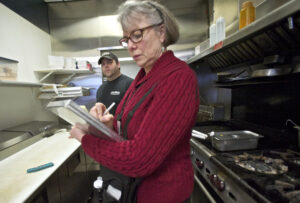10 Tips for Dealing with Health Inspectors
 Health inspectors are a necessary evil in any restaurant business. No owner enjoys the scrutiny or power of a third party deciding whether you are ‘up to snuff.’ Many restaurant owners spend months preparing for the moment. They are said to come like thieves in the night for they give no warning of their arrival.
Health inspectors are a necessary evil in any restaurant business. No owner enjoys the scrutiny or power of a third party deciding whether you are ‘up to snuff.’ Many restaurant owners spend months preparing for the moment. They are said to come like thieves in the night for they give no warning of their arrival.
Health inspectors work for public safety. Too many violations and your restaurant could be temporarily closed, impacting your bottom line.
Here are some of our home-grown tips on how to prepare for health inspectors:
Before Health Inspection
Conduct Weekly Inspections: The un-announced nature of health inspections means you must be ready at all times. Make in-house inspections apart of your weekly routine. Familiarize yourself with both state and local health codes and conduct your inspections by the letter of the law.
ServSafe Certification: ServSafe is a program administered by the National Restaurant Association that trains your staff in proper food handling, food safety, and alcohol servicing techniques. While ServSafe is not a requirement in Massachusetts, skimping on this certification can be a liability waiting to happen. A workforce that lacks knowledge is an ignorant workforce. Food poisoning could lead to an all-out investigation, closing your restaurant for weeks if not months!
Quiz Employees: Health inspectors may not only question you but your employees. Make sure they’re prepared for inquiries.
Monthly In-services: Depending on the program, ServSafe certifications need to be renewed once every three years! Over time, information learned can grow fuzzy and employees need a refresher in the interim. Gather your employees for quick 15 to 20 minute information sessions that focus on a hot topic, such as cross-contamination, hand washing, and internal temperature requirements.
During Health Inspection
Ask for Health Inspector’s Credentials: Always ask for a health inspector’s credentials before you allow someone to see your back operations. There have been reports of people passing themselves off as health inspectors when they’re really impostors. Also, ask whether this is a routine inspection or due to a customer complaint. Train your employees to ask for credentials as well.
Don’t Refuse An Inspection: This will not only aggravate the inspector, but they will most likely obtain a warrant to your restaurant of which they can enter without your consent or presence.
Shadow the Health Inspector: Don’t invade his personal space, but do tag along and ask for an explanation of any violations he finds. Depending on the nature of the violation, you can fix on the spot or ask for clarification so you know what needs to be done going forward.
Sign the Inspection Report: This does not mean you agree with the findings; it only confirms that you have received a copy of the inspection report. You can appeal the findings if you believe the violations are in error.
Don’t Offer Food: Offering refreshments may be tempting, but your hospitable nature may be misconstrued as bribery.
Following Health Inspection
Fix Critical Violations: Review the inspection report and fix critical issues as soon as possible. Determine how the violation occurred and make adjustments in training to avoid repeats. Inspectors will typically come shortly after to re-inspect and pass you for another year.
Appeal a Violation: Oftentimes it’s easier to fix then appeal, but if you truly feel that a recorded violation is incorrect, you can call the local health department and speak with an inspector’s supervisor.
To evaluate your current coverages, contact Brian Kilcoyne at 617-612-6515 or email him at briankilcoyne@hkinsurance.com.
